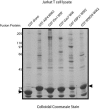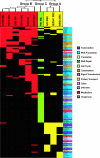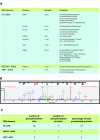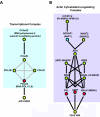WW domains provide a platform for the assembly of multiprotein networks
- PMID: 16055720
- PMCID: PMC1190255
- DOI: 10.1128/MCB.25.16.7092-7106.2005
WW domains provide a platform for the assembly of multiprotein networks
Abstract
WW domains are protein modules that mediate protein-protein interactions through recognition of proline-rich peptide motifs and phosphorylated serine/threonine-proline sites. To pursue the functional properties of WW domains, we employed mass spectrometry to identify 148 proteins that associate with 10 human WW domains. Many of these proteins represent novel WW domain-binding partners and are components of multiprotein complexes involved in molecular processes, such as transcription, RNA processing, and cytoskeletal regulation. We validated one complex in detail, showing that WW domains of the AIP4 E3 protein-ubiquitin ligase bind directly to a PPXY motif in the p68 subunit of pre-mRNA cleavage and polyadenylation factor Im in a manner that promotes p68 ubiquitylation. The tested WW domains fall into three broad groups on the basis of hierarchical clustering with respect to their associated proteins; each such cluster of bound proteins displayed a distinct set of WW domain-binding motifs. We also found that separate WW domains from the same protein or closely related proteins can have different specificities for protein ligands and also demonstrated that a single polypeptide can bind multiple classes of WW domains through separate proline-rich motifs. These data suggest that WW domains provide a versatile platform to link individual proteins into physiologically important networks.
Figures









References
-
- Bedford, M. T., D. Sarbassova, J. Xu, P. Leder, and M. B. Yaffe. 2000. A novel pro-Arg motif recognized by WW domains. J. Biol. Chem. 275:10359-10369. - PubMed
-
- Bednarek, A. K., K. J. Laflin, R. L. Daniel, Q. Liao, K. A. Hawkins, and C. M. Aldaz. 2000. WWOX, a novel WW domain-containing protein mapping to human chromosome 16q23.3-24.1, a region frequently affected in breast cancer. Cancer Res. 60:2140-2145. - PubMed
Publication types
MeSH terms
Substances
LinkOut - more resources
Full Text Sources
Other Literature Sources
Molecular Biology Databases
Research Materials
